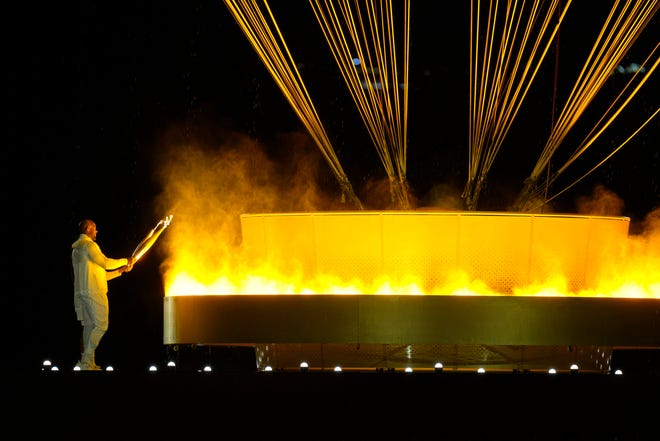Olympic spirit is a refreshing respite from an ugly election year | R. Bruce Anderson

It’s the first week of August, and ordinarily I’d be up to my neck is prep for the fall semester: new syllabi; old syllabi that need to become new; our new program in Public Administration needs attention; there are internships to be set up with campaigns; and the endless crazy of getting ready to welcome new members to our community of scholars and all the detail work that requires of the whole crew.
And, in my spare time, I’d be crabbing about the political situation, thrashing around in endless campaign arguments and complaining about either too much or too little rain.
I would, anyway, if there were any way to unstick myself from these games.
The Olympics of 2024 have been an almost unparalleled thrill, with few exceptions. Some of the commentators, especially in gymnastics, are bent on bleeding the joy out of what, to me, look like beautiful routines. And nobody can usefully explain that weird “Bacchus-in-purple-underwear” thing that jumped out of an otherwise truly amazing opening ceremony.
As of this writing, the USA is doing great. Stars all over the events, medals in things I’d never heard of (the women of USA “Rugby Sevens” have a new fan) and in old favorites, too. The coverage has been pretty tight, with only the occasional appearance of what looks to be a weeping cat peering over the label “generic stream fail” or something.
But I’ve needed this – maybe we’ve all needed this. The first half of the summer was consumed with the raucous GOP convention, an assassination attempt on one of our presidential candidates, the dropout of the other candidate and a sudden surge in both general weirdness and trash-talking drivel from both sides.
It’s been a long July. And there’s so much more to come.
We should be reminded that the modern Olympics are a revival — a redux — of a very, very old tradition. The ancient Greeks came up with these contests. Two sets, actually: the Olympic (every four years) and the Isthmian games (every second and fourth Olympic year). The Isthmian games were in honor of the Greek gods of the sea (and of horses), Poseidon, and held at Corinth. The Olympic games were held at Olympus, in honor of the Zeus.
Both games were open to all Greeks, and because of their religious foundation and open format, pretty much everything else, including wars, had to halt while they were held. Intensely competitive, folks streamed in from all over, eating and drinking and behaving pretty much as any athletic crowd might.
But for a few days (the ancient Olympics lasted only 5, with the last dedicated to handing out prizes and a huge feast for the competitors) politics and other conflict was forgotten, or at least put on hold, and people gathered to watch the best of the best athletic, music, poetry and theater competitions – together.
Watching this year’s games, it’s hard to miss the fact that it’s not the differences, but the parallels that stand out. More than 200 countries and territories are here, with over 10,000 athletes. They range from China, the USA and France, for example, to tiny St. Kitts.

There are even teams made up of refugees and “Individual Neutral Athletes.” There are 14-year-old skateboarders and a 59-year-old Chilean Table Tennis champ. And they’re all here, with all their fans, from all over the planet, having fun and enjoying the clashes – together.
I’m no Pollyanna. I know that once the games come to an end, it’s probably back to the same strife and conflict and nastiness. But we’ve got to hope that a tiny shred of that international understanding might linger — that we’re all folks who’d rather be having a good time than battling figuratively or literally over politics or religion or cultural differences.
These are amazing people out there collaborating on the fields of competition, and their message could not be clearer.
R. Bruce Anderson is the Dr. Sarah D. and L. Kirk McKay, Jr. Endowed Chair in American History, Government, and Civics and Miller Distinguished Professor of Political Science at Florida Southern College. He is also a columnist for The Ledger and political consultant and on-air commentator for WLKF Radio in Lakeland.